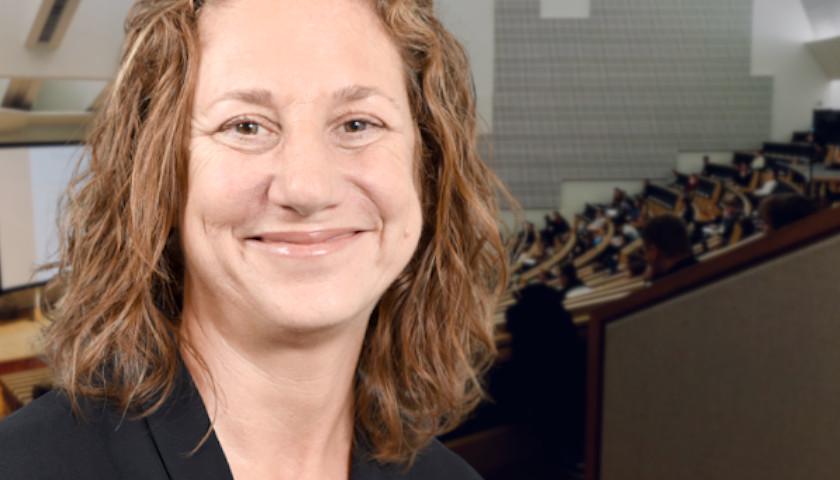Award-winning professor Stanley K. Ridgley, author of the book Brutal Minds: The Dark World of Left-Wing Brainwashing in Our Universities, called out a Arizona State University (ASU) psychology professor over her use of “white guilt” in the classroom in order to ply students into pursuing social justice activism.
Dr. Lisa B. Spanierman, who is an associate dean for academic personnel and faculty success in ASU’s College of Integrative Sciences and Arts, as well as a faculty member in the psychology department, caught Ridgley’s attention with a chapter she authored in the book, Guilt: A Force of Cultural Transformation.
Titled “White Guilt in the Summer of Black Lives Matter,” the chapter expounds on her belief that white guilt contributed to the Black Lives Matter movement during the summer of 2020.
Ridgley said, “[I]f Spanierman and her fellow travelers can generate fake ‘collective guilt’ feelings in their students, they can more easily persuade these students to do the ‘antiracist’ work that she wants them to. That is indoctrination, not education.”
He added, “she harnesses psychology to her ‘social justice’ agenda and calls for application of psych-manipulation of students to achieve political goals.”
In the chapter she authored, Spanierman (pictured above) said, “My colleagues and I conducted several studies that suggest how concomitant race-related emotions influence prosocial justice outcomes.” She expounded, “I argue that a particular form of collective guilt — white guilt — also has interpersonal, reparative possibilities. Despite staunch criticism from both sides of the political spectrum, white guilt can indeed be a socially productive force.” She went on, “I use psychological science to explore the conditions under which white guilt disrupts the racial status quo and seeks to repair relationships between white people and BIPOC in ways that could in fact lead to social change.”
Spanierman added, “[E]vidence strongly suggests that higher levels of white guilt are associated with a variety of prosocial outcomes.” For example, “those white undergraduate and graduate student participants who scored higher on white guilt showed greater willingness to confront white privilege.”
Spanierman explained why those on the Left are more likely to have guilt about race.
“Evidence suggests that the more one identifies with an in-group (the perpetrator or beneficiary group), the stronger one experiences collective guilt feelings,” she said. “Research participants with a liberal ideology tend to score higher on collective guilt than those with a politically conservative ideology.”
She said, “Findings suggest that multicultural instruction, such as diversity courses and workshops, increase white guilt.”
Spanierman “suspected” that “years” of former President Donald Trump’s “inflammatory, racist rhetoric along with anxiety and frustration related to his mishandling of a catastrophic global pandemic also played an important role in the strong support for Black Lives Matter among white people during the summer of 2020.”
She said, “If white guilt (a particular form of collective guilt) does play a role in collective action, then we need not be so quick to dismiss expressions of guilt feelings among white people.”
Ridgley said he believes Spanierman’s method is a form of brainwashing.
“It is unlikely that anyone would willingly submit to such a program, so these psyche-manipulators never announce themselves as such,” he said. “They maintain a moral deception with anodyne clichés, such as ‘learning about race’ or ‘multicultural competence,’ while undermining their students’ sense of self to alienate them from their parents and friends. This is the classic brainwash.”
He added, “Building on a body of work in ‘counseling psychology,’ Spanierman’s flagrant brainwashing technique is to create classroom scenarios designed to generate collective guilt in students by exposing them to carefully curated material such as films and selected readings. The technique is hardly new and has become standardized in ‘diversity’ courses.”
Spanierman’s work is getting noticed. An article published by the American Psychological Association titled “Psychology’s Urgent Need to Dismantle Racism” said that guilt causing “discomfort may prove useful” and quoted her.
“Guilt when coupled with true empathy and understanding of the structures of White supremacy and how they operate in society can motivate White people to action,” Spanierman said.
Other articles Spanierman has written include “Confronting Whiteness in Developmental Science: Disrupting the Intergenerational Transmission of White Racism” and “Measuring Whiteness: A Systematic Review of Instruments and Call to Action,” which she co-authored. The latter contains “suggestions on how advancement, development, and use of Whiteness measures could further our knowledge through research examining present-day racial justice issues. The issues highlighted include police brutality, xenophobia, immigration, White supremacy, activism, and training in the field.”
– –
Rachel Alexander is a reporter at The Arizona Sun Times and The Star News Network. Follow Rachel on Twitter. Email tips to [email protected].
Photo “Dr. Lisa B. Spanierman” by Arizona State University.






and another “educator” promoting division.